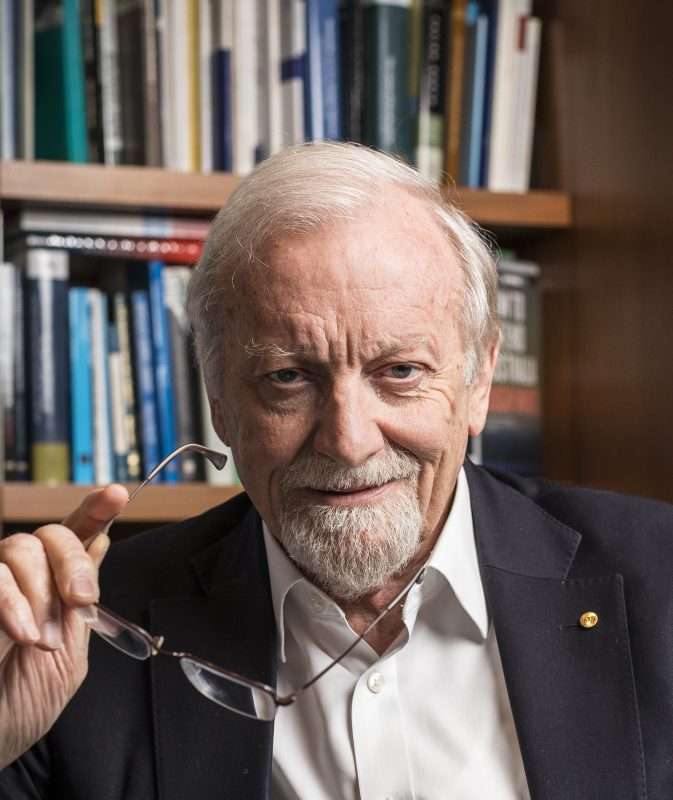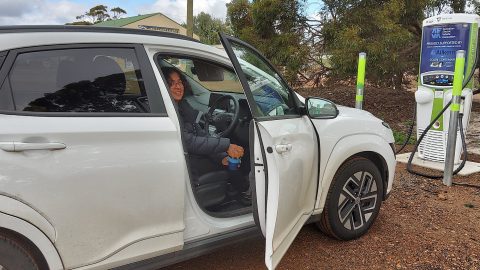Politics played a significant part in the birth of AUKUS in Australia, and politics both here and in the United States will play a crucial role in determining whether it lives or dies. That is so at least for its core submarine component. The second pillar of the agreement, relating to technical cooperation on multiple new fronts, is both much less clear in its scope and less obviously politically fraught.

04/12/19 ANU Chancellor Gareth Evans. Photograph by Chris Hopkins
On the Australian side, partisan political opportunism was a factor in the initiation of the submarine deal, bipartisan political support was a condition of US agreement to it, and maintenance of that bipartisan support into the future presumably will be a precondition of its continuance, at least when it comes to highly sensitive elements like the handover of three Virginia class submarines.
On the American side, it was perception of US strategic advantage that drove Washington’s agreement to the deal, rather than any domestic political considerations. But strong cross-party support in Congress will remain necessary for its complete delivery. And, at the even more critical executive level, it cannot be assumed the deal is now Trump-proof.
It is only in the United Kingdom that we can reasonably regard domestic politics to be irrelevant to AUKUS’s future. The deal is so obviously a gift to the national Treasury, and has so little impact on national defence and security interests, that no one on any side of politics is ever likely to find it unpalatable.
In Australia, domestic politics have been a factor from the outset. While for the Morrison government the primary driver of the AUKUS decision was, no doubt, the ideological passion of senior Coalition ministers for all things American, it is hard to deny political opportunism came a close second.
Morrison was deeply conscious of the opportunity the deal presented to wedge the Labor opposition in the defence and security space, where the Labor Party has long been perceived, rightly or wrongly, as electorally vulnerable. That the nuclear dimension of the deal was bound to ruffle some feathers in Labor ranks was an added political attraction.
I was not critical at the time, and nor am I now, of the opposition’s initial response in September 2021 when told at the last minute by Morrison of the imminent announcement of the deal he had struck with the US and UK, premised on Labor’s support.
The political imperative was clear: had Labor been at all equivocal, 2022 would have been a khaki election, with Albanese depicted as undermining the alliance and undermining US commitment to the region. Moreover, the deal was at least prima facie defensible intellectually, with nuclear propulsion clearly superior in terms of speed, endurance and (for now, at least) detectability. Concerns about nuclear proliferation and waste concerns were also being reasonably met.
But the Morrison Government was roundly to be criticised for comprehensively mishandling its breakup with the French, and there were very real questions still to be answered before the submarine deal was finally bedded down. Of particular concern was whether the force configuration proposed was really fully fit for Australia’s strategic purposes, and the implications of much greater enmeshment with the US military for the reality of our sovereign agency. But there would be plenty of time when Labor came into government for review, negotiation and readjustment.
What I am now critical of, is that when Labor did come into office in May 2022, it is clear no such serious review of the whole AUKUS deal ever took place. Crucial questions were never seriously addressed; clearly articulated answers to them have never been given by the prime minister, defence minister or anyone else. The answers that are in fact emerging as further time passes are deeply troubling.
If a genuinely comprehensive and genuinely objective review were now to be initiated by the Albanese government, it would, I believe, have no choice but to make these major findings.
One, there is zero certainty of the timely delivery of the eight AUKUS boats. We now know that both the US and UK have explicit opt-out rights. And even in the wholly unlikely event that everything falls smoothly into place in the whole vastly complex enterprise, we will be waiting 40 years for the last boat to arrive, posing real capability gap issues.
Two, even acknowledging the superior capability of the submarines, the final fleet size – if its purpose really is the defence of Australia – appears hardly fit for that purpose. Just how much intelligence gathering, or archipelagic chokepoint protection, or sea-lane protection, or even just “deterrence at a distance”, will be possible given usual operating constraints – which would here mean having only two boats deployable at any one time?
Three, the eye-watering cost of the AUKUS submarine program, up to $368 billion, will make it very difficult, short of a dramatic increase in the defence share of GDP, to acquire the other capabilities we will need if we are to have any kind of self-reliant capacity in meeting an invasion threat. Those capabilities include, in particular, state-of-the-art missiles, aircraft and drones, that are arguably even more critical than submarines for our defence in the event of such a crisis.
Four, the price now being demanded by the US for giving us access to its nuclear propulsion technology is extraordinarily high. Not only the now open-ended expansion of Tindal as a US B52 base; not only the conversion of Stirling into a major base for a US Indian Ocean fleet, making Perth now join Pine Gap and the North West Cape – and increasingly likely, Tindal – as a nuclear target; not only the demand for what is now described not as the interoperability but the “interchangeability” of our submarine fleets. But also now the ever-clearer expectation on the US side that “integrated deterrence” means Australia will have no choice but to join the US in fighting any future war in which it chooses to engage anywhere in the Indo-Pacific, including in defence of Taiwan.
It defies credibility to think that, in the absence of that last understanding, the Virginia transfers will ever proceed. The notion that we will retain any kind of sovereign agency in determining how all these assets are used, should serious tensions erupt, is a joke in bad taste. I have had personal ministerial experience of being a junior allied partner of the US in a hot conflict situation – the first Gulf War in 1991 — and my recollections are not pretty.
Five, the purchase price we are now paying, for all its exorbitance, will never be enough to guarantee the absolute protective insurance that supporters of AUKUS think they are buying. ANZUS, it cannot be said too often, does not bind the US to defend us, even in the event of existential attack. And extended nuclear deterrence is as illusory for us as for ever other ally or partner believing itself to be sheltering under a US nuclear umbrella. The notion that the US would ever be prepared to run the risk of sacrificing Los Angeles for Tokyo or Seoul, let alone Perth, is and always has been nonsense.
We can rely on military support if the US sees it in its own national interest to offer it, but not otherwise. Washington will no doubt shake a deterrent fist, and threaten and deliver retaliation, if its own assets on Australian soil are threatened or attacked, but that’s as far as our expectations should extend.
The bottom line in all of this was very presciently stated by Jean-Yves Le Drian, the then French foreign minister, in reacting to the Morrison decision in 2021:
The Australians place themselves entirely at the mercy of developments in American policy. I wish our Australian partner, who made the choice of security – justified by the escalation of tensions with China – to the detriment of sovereignty, will not discover later that it has sacrificed both.
In the event that some of this political light did start to dawn on the Albanese government and it did start to explore a Plan B, it would not be impossibly late to change course yet again. Then the most attractive option would probably be – if Paris ever felt able to trust us again – the revival of the French contract.
This provided for the delivery of 12 conventionally powered, but very capable boats, at a reasonable cost and within a reasonable time frame. It also explicitly allowed for a nuclear option to be pursued should we so desire. That change would involve more time and expense, and some new and serious complications in working out how to manage the nuclear refuelling and maintenance needs of an LEU (Low Uranium Enriched) system, but overall would involve much less baggage for us than continuing with the AUKUS program.
All that said, it has to be acknowledged that the odds of any fundamental change of course are now very long indeed. The only external event that could completely derail the AUKUS program and force such change would be the US making it clear that it was not going to give up any of its Virginias, because of the pressures on its own replacement program. But it’s hard to imagine even a Trump administration doing that, given the extraordinary favourability of the deal the US has wrung out of Australia – not only financially, but because for all practical purposes the Americans will be able to treat these boats as an extension of their own fleet.
The prospects of a political change of heart in Australia are even more problematic. On the part of the Coalition, in the absence of the reincarnation of Malcolm Turnbull, they are non-existent. And on the part of the ALP they are not much better. The prime minister is still preoccupied with avoiding being wedged as weak on security, has never given great attention to the complexities of foreign and defence policy, and seems unlikely to change.
All this is rather depressing for those of us who have long nurtured the belief that Australia is a fiercely independent nation, ever more conscious of the need to engage constructively, creatively and sensitively with with our own Indo-Pacific neighbourhood, and with a vibrant multicultural society ever more representative of the world around us.
A country that had come to terms at last with the reality that in the new century, our geography matters much more than our Anglophone history. And a country that had put behind us the “fear of abandonment” which had been so central to our defence and diplomacy for so much of the last century: recognising, as Paul Keating continues to put it so articulately, that we need to find our security in Asia, not from Asia.
Australia’s no-holds-barred embrace of AUKUS is more likely than not to prove one of the worst defence and foreign policy decisions our country has made, not only putting at profound risk our sovereign independence, but generating more risk than reward for the very national security it promises to protect. I cannot imagine this decision being made by any of the Hawke-Keating governments of which I was part. Times have changed.
src=”https://counter.theconversation.com/content/236938/count.gif?distributor=republish-lightbox-basic” alt=”The Conversation” width=”1″ height=”1″ style=”border: none !important; box-shadow: none !important; margin: 0 !important; max-height: 1px !important; max-width: 1px !important; min-height: 1px !important; min-width: 1px !important; opacity: 0 !important; outline: none !important; padding: 0 !important” referrerpolicy=”no-referrer-when-downgrade” />
Gareth Evans, Distinguished Honorary Professor, Australian National University
This article is republished from The Conversation under a Creative Commons license. Read the original article.







